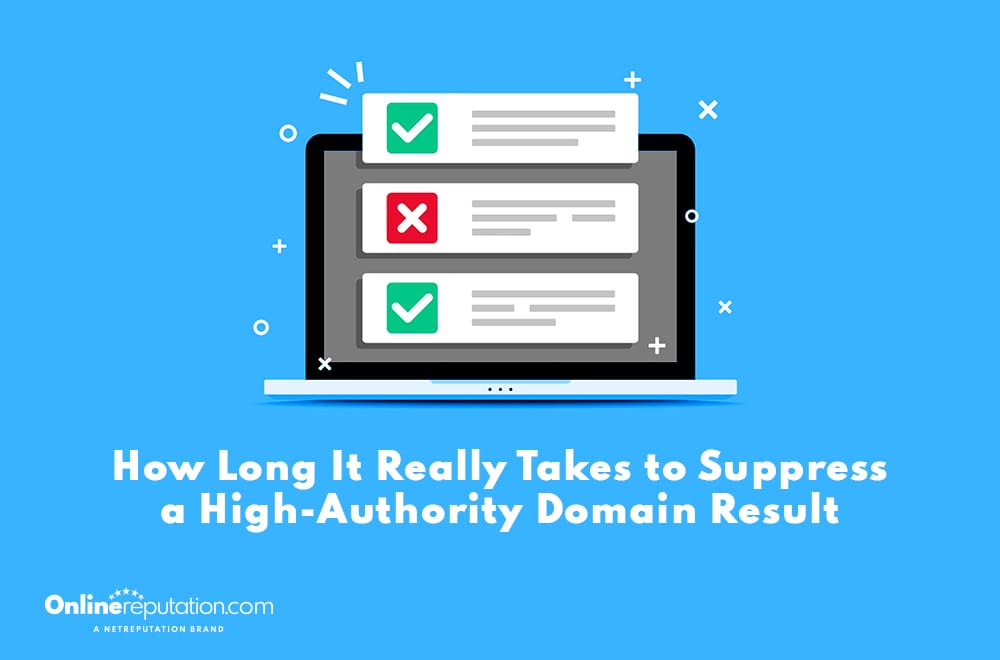
Search engine results can significantly impact your online presence. If a high-authority domain result—like a news article, review site, or old listing—outranks your content in Google search results, it can seriously affect your reputation and visibility.
For professionals and businesses alike, understanding how to suppress a high-authority domain result without crossing ethical lines is critical to managing your search engine optimization (SEO) effectively.
What Is a High-Authority Domain?
High-authority domains are websites that search engines trust and consider reliable. They often include major publications, review platforms, university websites, and other authoritative sites with a strong backlink profile. These sites tend to dominate search engine result pages (SERPs) because they have high domain authority (DA), which is a metric that estimates a website’s ability to rank.
A website’s domain authority score ranges from 1 to 100, and it reflects factors such as:
- The number of linking root domains (i.e., unique websites linking back to it)
- The quality of inbound links
- The site’s overall trustworthiness and content relevance
Tools like Moz’s Domain Authority Checker can help you evaluate a site’s DA score. Typically, a good domain authority score is above 50, although this varies depending on the industry and level of competition.
What Is Domain Authority and Why Does It Matter?
Domain authority is not a direct Google ranking factor, but it’s a useful metric in SEO strategy. It provides insight into how well your website might perform in search engine rankings compared to others. A higher domain authority score typically indicates a better chance of ranking high on Google.
Your site’s DA is calculated based on:
- Total number of quality backlinks
- Referring domains
- Link diversity (i.e., not all backlinks from the same domain)
- Spam score (penalizing bad links or spammy websites)
- Site structure and technical SEO
Improving domain authority can help you:
- Increase domain authority over time
- Strengthen your website’s credibility
- Attract quality links from relevant websites
- Boost organic search traffic
What Is Page Authority?
While domain authority assesses the entire website, page authority (PA) focuses on a specific page. This is useful when a particular blog post or service page is underperforming or being outranked by other sites.
PA includes factors like:
- Internal links to the page
- External links pointing to the page
- Relevance of the content
- Engagement metrics like time on page
Both DA and PA help form a more complete picture of your site’s SEO performance.
What Does It Mean to Suppress a High-Authority Domain Result?
To suppress a high-authority domain result means pushing that result down in the search rankings by elevating more favorable or accurate content above it. This does not involve removing the content but outcompeting it in Google’s algorithm using clever SEO tactics.
This is often necessary when:
- Outdated or misleading content from an authoritative site ranks first
- Your site or positive mentions are buried deeper in search results
- High authority domains are crowding out your visibility
Why Suppression Can Be So Challenging
Suppressing a result from a high domain authority website is tough because these sites:
- Have strong backlink profiles
- Often have higher DA scores than your site
- Regularly publish high-quality content that performs well with users
This means your SEO strategy must go beyond basic tactics and focus on high-effort, long-term moves.
Steps to Suppress a High-Authority Domain Result
1. Run a Comprehensive SEO Audit
Use tools like Google Search Console, Moz, or Ahrefs to analyze your:
- DA score
- Backlink profile
- Ranking keywords
- Spam score (to identify toxic backlinks)
Remove or disavow toxic links that lower your site’s credibility and DA.
2. Create High Quality Content
Produce relevant content that directly addresses user search intent. This might include:
- Blog posts
- Case studies
- FAQs
- Updated service pages
Ensure you’re linking to relevant content using internal links and adding outbound links to other authoritative sites. The goal is to make your site a stronger, more trustworthy resource.
3. Pursue High Quality Backlinks
Use link-building strategies to get backlinks from:
- Authority sites in your niche
- Relevant industry blogs
- High domain authority websites
This increases your own domain’s Domain Authority (DA) and makes your content more competitive.
4. Optimize Technical SEO
Make sure your site:
- Loads fast
- Is mobile-friendly
- Has structured data markup
- Fixes broken links and redirects
WordPress users should also leverage SEO plugins and schema tools to enhance visibility.
5. Target Keyword Variants
Sometimes you won’t outrank the exact keyword, but you can target variations and long-tail terms. Doing so helps you capture more search real estate and improve your site’s Domain Authority (DA) score.
How Long Does It Take?
Suppressing a high authority domain result doesn’t happen overnight. It depends on:
- Your current domain authority score
- The strength of the competing site
- Your content’s depth and quality
- Your link-building pace
Realistically, results can take anywhere from 1 to 6 months or longer.
Risks and Considerations
Trying to suppress a high-authority domain without a solid strategy can backfire. Risks include:
- Wasting resources on ineffective tactics
- Lowering your own site’s DA through bad links or keyword stuffing
- Damaging your website’s SEO performance if you rely on shortcuts
Avoid:
- Buying backlinks from spammy websites
- Repeating low-quality or duplicate content
- Over-optimizing with too many outbound links or irrelevant keywords
Better Alternatives to Domain Suppression
Instead of fighting an uphill battle, consider these complementary strategies:
- Build a strong personal or business brand across social profiles, press releases, and podcast appearances
- Improve your domain authority score steadily through ethical SEO
- Collaborate with other websites to publish thought leadership content
- Create targeted landing pages around positive topics or reviews
These can help dilute negative results and strengthen your online presence over time.
Final Thoughts
A single high-authority domain result can skew how you or your brand is perceived in Google search results. But with the right SEO strategy, supported by quality backlinks, relevant content, and technical improvements, you can push stronger pages to the top.
If your site’s DA score is holding you back—or if you’re unsure where to start—check domain authority using tools like Moz or Ahrefs. From there, build an action plan focused on real content and authentic links.
Domain suppression isn’t about playing tricks. It’s about proving to search engines—and your audience—that your voice deserves to be seen.
You might also like
Can ORM Actually Remove Competitor-Planted Reviews?
Search engine results can significantly impact your online presence. If a high-authority domain result—like a news article, review site, or …

